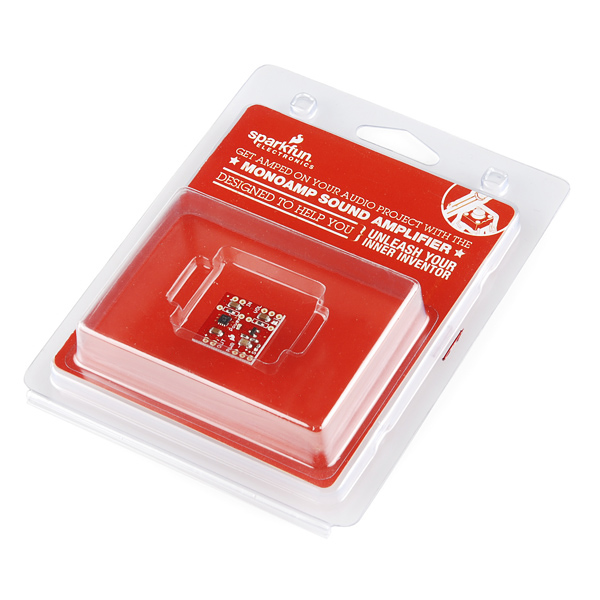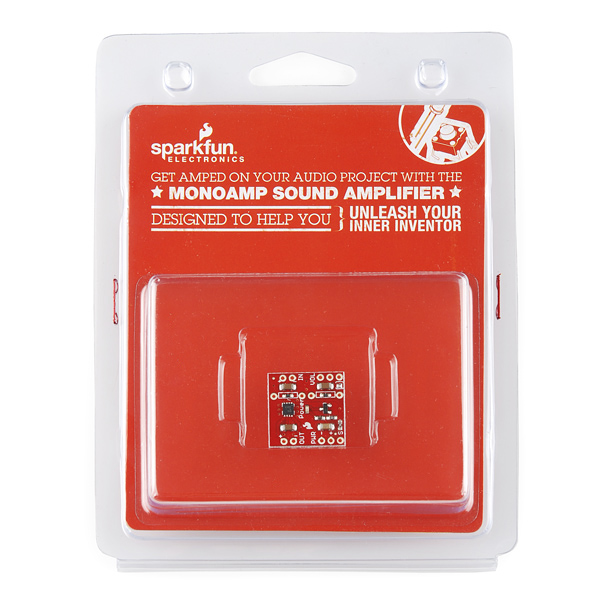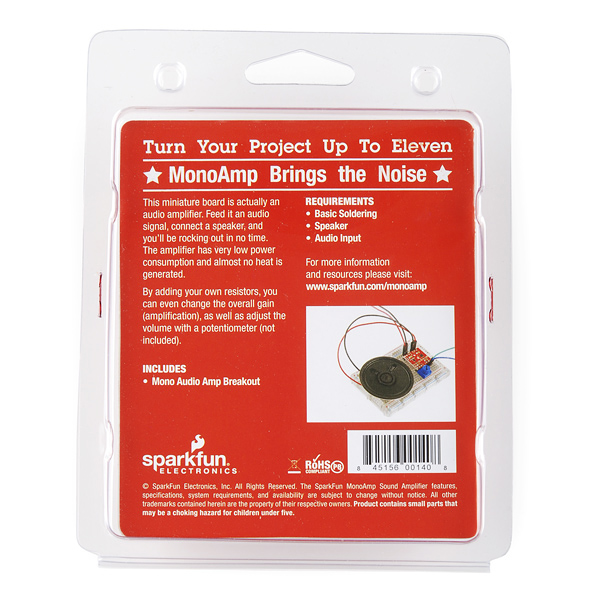MonoAmp - Sound Amplifier Retail
This is the same product as the Mono Audio Amp Breakout. The difference is this version comes in fancy clamshell packaging meant for our distributors that need it. Regular customers are welcome to order, but we want to limit the amount of extra packaging finding its way into the trash heap.
This tiny audio amplifier is based on the Texas Instruments TPA2005D1. Its efficient class-D operation means low heat and long battery life. It can drive an 8-Ohm speaker at up to 1.4 Watts; it won't shake a stadium, but it will provide plenty of volume for your audio projects.
The fully-differential inputs are safe for floating audio signals such as from our MP3 Shield, and can also be connected to ground-referenced signals as well. A shutdown input is provided to save power when the amplifier is not being used, and a solder jumper and header are provided to connect a volume-control potentiometer (not included).
Note: The amplifier's class-D design outputs a 250Khz PWM-like signal that is restored to an analog voltage in the speaker's coil. This is what makes the amplifier so efficient, but because of the switching frequency, you should keep the amplifier as close to the speaker as possible to minimize possible interference.
- Extremely efficient class-D amplifier
- 1.4W into 8 Ohms
- 2.5V to 5.5V supply
- Fully differential audio inputs, can be ground-referenced as well
- Shutdown input with pullup and LED-follows-shutdown circuitry
- PTH pads provided to change gain resistors if desired (see datasheet for details)
- Solder jumper and header allow addition of a 10k volume control potentiometer (not included)
- Schematic
- Eagle files
- Datasheet (TPA2005D1)
- Quickstart Guide
MonoAmp - Sound Amplifier Retail Product Help and Resources
Core Skill: Soldering
This skill defines how difficult the soldering is on a particular product. It might be a couple simple solder joints, or require special reflow tools.
Skill Level: Rookie - The number of pins increases, and you will have to determine polarity of components and some of the components might be a bit trickier or close together. You might need solder wick or flux.
See all skill levels
Core Skill: Programming
If a board needs code or communicates somehow, you're going to need to know how to program or interface with it. The programming skill is all about communication and code.
Skill Level: Rookie - You will need a better fundamental understand of what code is, and how it works. You will be using beginner-level software and development tools like Arduino. You will be dealing directly with code, but numerous examples and libraries are available. Sensors or shields will communicate with serial or TTL.
See all skill levels
Core Skill: Electrical Prototyping
If it requires power, you need to know how much, what all the pins do, and how to hook it up. You may need to reference datasheets, schematics, and know the ins and outs of electronics.
Skill Level: Rookie - You may be required to know a bit more about the component, such as orientation, or how to hook it up, in addition to power requirements. You will need to understand polarized components.
See all skill levels
Comments
Looking for answers to technical questions?
We welcome your comments and suggestions below. However, if you are looking for solutions to technical questions please see our Technical Assistance page.
Customer Reviews
No reviews yet.




Is 1.4 watts enough to make an alarm, perhaps playing an MP3 yelling "help, stop this bike thief" over and over? So not necessarily ear-piercing, but attention-getting.
I was going to build one, but now you sell them. What's the audio difference in quality on differential vs. ground referenced? I think my analog to digital converter is single ended output only.
There should be no noticeable difference, use whatever accommodates your audio output the best.